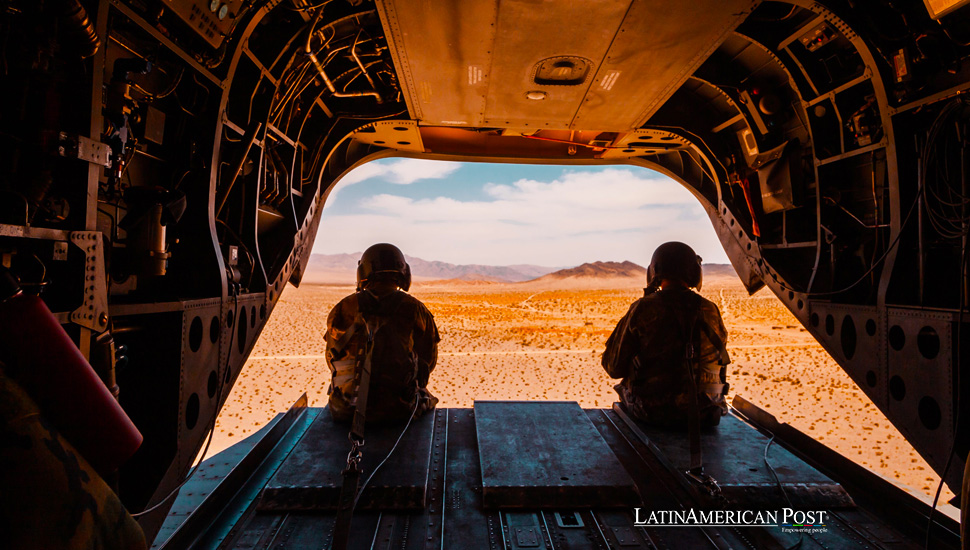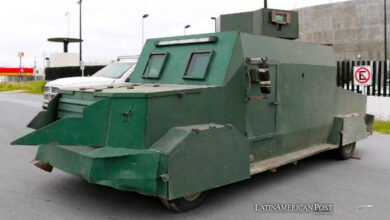Geopolitical Chess Unravels as U.S. Boosts Guyana’s Military Amid Venezuela Territorial Dispute

Amid escalating tensions with Venezuela over territorial claims, Guyana receives significant military assistance from the United States, marking a pivotal moment in the South American geopolitical landscape.
U.S. Boosts Military Assistance Amidst Venezuelan Threat
In a move that underscores the strategic importance of Guyana in the South American geopolitical arena, the United States government has announced a substantial increase in military assistance to the country. This decision comes as Guyana faces a looming threat from neighboring Venezuela, which has long disputed a significant portion of Guyanese territory. The U.S. commitment includes the provision of new aircraft, helicopters, a fleet of military drones, and, notably, radar technology—a first for Guyana. While the deal’s specifics, including the financial outlay expected from Guyana, remain under wraps, the announcement has sparked considerable interest in the defense and diplomatic communities.
The backdrop to this bolstered U.S. support is a series of high-level engagements between American and Guyanese officials to enhance Guyana’s defense capabilities. Notably, U.S. Deputy National Security Advisor Jon Finer and Western Hemisphere Senior Director Juan González recently met with Guyanese authorities, signifying the importance of this alliance. This meeting, part of a broader initiative that has seen figures such as Secretary of State Antony Blinken engage with Guyana, highlights the United States’ commitment to aiding Guyana in safeguarding its territorial integrity.
Defensive Cooperation and Diplomatic Veils
Jon Finer’s remarks to the press emphasized the defensive nature of this cooperation, framing it as a measure to enable Guyana to protect itself against any external threats. While diplomatically veiled, Finer’s comments were an apparent rebuke to Venezuela’s aggressive posturing, which has included military build-ups along its eastern border and threats to annex the mineral-rich Essequibo region. Venezuela’s actions, including a referendum to legitimize the annexation, have heightened tensions and drawn international attention to the dispute.
Efforts to de-escalate the situation have been underway, with Brazil and Caribbean leaders mediating talks between the two countries. A significant meeting between the foreign ministers of Venezuela and Guyana, held in Brazil, has laid the groundwork for a summit between Venezuelan President Nicolás Maduro and Guyanese President Irfaan Ali. These diplomatic endeavors aim to resolve the territorial dispute peacefully, even as Guyana strengthens its military readiness with U.S. assistance.
Bolstering Guyana’s Defensive Posture
With a modest military comprising fewer than 5,000 troops to defend a population of approximately 800,000, Guyana has faced challenges in ensuring its territorial sovereignty. The U.S. military’s support, including overflight surveillance flights and the deployment of military advisers, has been instrumental in enhancing Guyana’s defensive posture.
President Irfaan Ali’s announcement of Guyana’s plans to acquire a fleet of at least four U.S. helicopters, drones, fixed-wing planes, and other military equipment marks a significant step in bolstering the country’s defense capabilities. This move signals Guyana’s commitment to defending its territory and reflects the deepening of U.S.-Guyana defense cooperation.
The U.S.’s increased military assistance to Guyana amidst its territorial dispute with Venezuela represents a critical juncture in South American geopolitics. It underscores the United States’ strategic interest in maintaining regional stability and supporting allies facing external threats. Moreover, this assistance highlights the complexities of international relations in South America, where historical territorial disputes intersect with contemporary geopolitical dynamics.
The international community watches closely as Guyana prepares to enhance its military capabilities with U.S. support. The outcome of the Venezuelan-Guyanese dispute and the role of U.S. military assistance in shaping this outcome will have lasting implications for regional stability and the principles of territorial integrity and sovereignty.
Diplomacy vs. Militarization: Unraveling Tensions
The situation also raises questions about the future of diplomatic efforts to resolve the dispute and the potential for militarization to escalate tensions further. While military support undoubtedly strengthens Guyana’s position, it underscores the importance of continued diplomatic engagement and the search for a peaceful resolution to territorial disputes.
In the broader context, the U.S.’s involvement in Guyana’s defense reminds us of the intricate web of alliances and interests that define international politics. As Guyana navigates the challenges posed by its larger neighbor, the support from the United States serves as a bolstering force, offering both military capabilities and a measure of diplomatic backing in the face of external threats.
Also read: Panama’s Martinelli Defies Legal Odds, Eyes Presidential Run Amid Conviction
As developments unfold, the eyes of the world remain fixed on this small but strategically significant corner of South America. The resolution of the Guyana-Venezuela territorial dispute, whether through diplomatic channels or bolstered defense postures, will undoubtedly influence the region’s geopolitical landscape for years to come. In this complex chess game of international relations, Guyana’s moves, supported by the United States, are watched with keen interest, offering lessons on the balance between military readiness and diplomatic negotiation in safeguarding national sovereignty.





